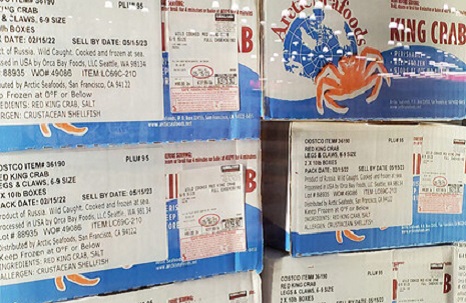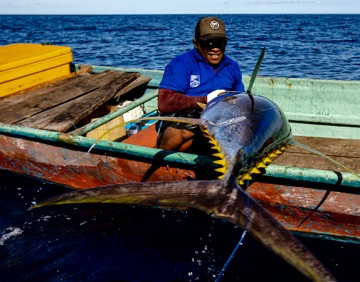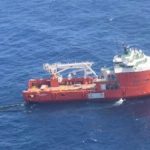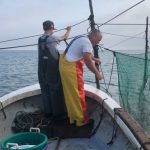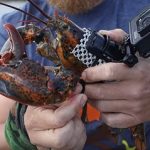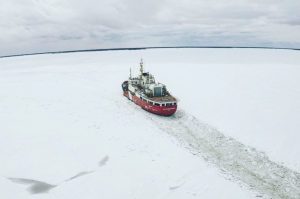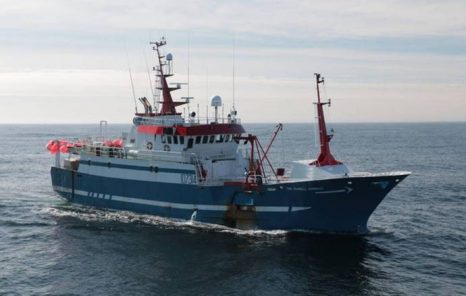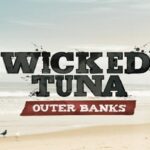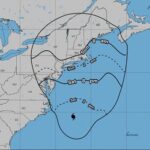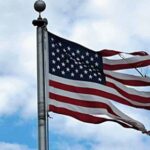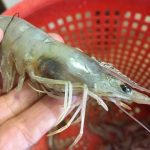Tag Archives: Marine Stewardship Council
Wild-caught prawn trawling is changing to reduce its environmental impact
 Therese Murphy and her family are proud of their part in improving the environmental reputation of Australia’s prawn trawling industry. Australian Ocean King Prawn’s 11 trawlers work a sandy seabed where there is no reef or seagrass, 120 kilometers off the coast of Gladstone. Compulsory satellite tracking and turtle excluder devices, which allow turtles, sharks and rays to safely escape, are standard equipment on every boat. The Urangan-based business independently adopted the additional environmental measure of installing electronic monitoring cameras, including lenses pointed at the ocean floor. In 2023, the Murphy’s made history by becoming Queensland’s first state-managed fishery to earn accreditation from the Marine Stewardship Council (MSC ), an international non-profit association aiming to set standards for sustainable fishing and end overfishing. Photos, more, >>CLICK TO READ<< 11:12
Therese Murphy and her family are proud of their part in improving the environmental reputation of Australia’s prawn trawling industry. Australian Ocean King Prawn’s 11 trawlers work a sandy seabed where there is no reef or seagrass, 120 kilometers off the coast of Gladstone. Compulsory satellite tracking and turtle excluder devices, which allow turtles, sharks and rays to safely escape, are standard equipment on every boat. The Urangan-based business independently adopted the additional environmental measure of installing electronic monitoring cameras, including lenses pointed at the ocean floor. In 2023, the Murphy’s made history by becoming Queensland’s first state-managed fishery to earn accreditation from the Marine Stewardship Council (MSC ), an international non-profit association aiming to set standards for sustainable fishing and end overfishing. Photos, more, >>CLICK TO READ<< 11:12
A lobster season Q&A: Supply and demand, price volatility and challenges in markets
 It’s never smooth sailing for the Atlantic Canada lobster industry. Each year there are issues and challenges to contend with. The weather and catches are beyond anyone’s control. But the one constant is how important this industry is economically to the region, and to the communities that rely on it. Tasked with such things as marketing and advocacy of the industry is the Lobster Council of Canada. In this Q&A, the council’s executive director, Geoff Irvine, talks about the industry, the upcoming lobster season in southwestern Nova Scotia, and the challenges that continue to stack up on the menu. Q: How does the fall opening of the LFA 33 and 34 districts look in comparison to previous seasons? more, >>CLICK TO READ<< 08:28
It’s never smooth sailing for the Atlantic Canada lobster industry. Each year there are issues and challenges to contend with. The weather and catches are beyond anyone’s control. But the one constant is how important this industry is economically to the region, and to the communities that rely on it. Tasked with such things as marketing and advocacy of the industry is the Lobster Council of Canada. In this Q&A, the council’s executive director, Geoff Irvine, talks about the industry, the upcoming lobster season in southwestern Nova Scotia, and the challenges that continue to stack up on the menu. Q: How does the fall opening of the LFA 33 and 34 districts look in comparison to previous seasons? more, >>CLICK TO READ<< 08:28
Jersey fisherman hopes new lobster label could help keep island’s fishing industry afloat
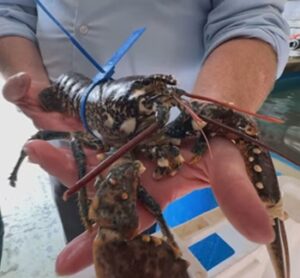 A Jersey fisherman hopes his new lobster label will raise public awareness about the island’s crustaceans in an attempt to increase demand among consumers. Last month, Ian Syvret won the Marine Stewardship Council’s (MSC) ‘Fishing Hero of the Year’ award for creating a new single-use label which includes the name of the fisher who caught the lobster. The blue label is attached to the lobster so it can be released alive and safe rather than clipping or marking the creature’s body. Ian’s award means that lobsters caught in Jersey can now be sold commercially with MSC eco status, which means he can now sell lobster to whoever he wants. more, >>CLICK TO READ<< 08:08
A Jersey fisherman hopes his new lobster label will raise public awareness about the island’s crustaceans in an attempt to increase demand among consumers. Last month, Ian Syvret won the Marine Stewardship Council’s (MSC) ‘Fishing Hero of the Year’ award for creating a new single-use label which includes the name of the fisher who caught the lobster. The blue label is attached to the lobster so it can be released alive and safe rather than clipping or marking the creature’s body. Ian’s award means that lobsters caught in Jersey can now be sold commercially with MSC eco status, which means he can now sell lobster to whoever he wants. more, >>CLICK TO READ<< 08:08
Judge dismisses lobster lawsuit, U.S.-caught crustaceans remain on
 A California judge has dismissed a case filed by local lobstermen who called foul after a seafood watch group put the fishery on a” Red List” for its impact on critically endangered right whales. The California-Based Monterey Bay Aquarium and the Marine Stewardship Council pointed to trap/pot fishing gear used to catch lobsters that has been blamed for the deaths of critically endangered right whales. The “Red List” decision pushed Whole Foods, Hello Fresh, Blue Apron, and others to stop selling the shellfish caught in U.S. waters. In March, four Massachusetts lobstermen, Arthur Sawyer, Jarret Drake, Eric Meschino, and Bill Souza, filed a class action lawsuit saying the conservationists’ move caused monetary harm. But Judge Beth Labson Freeman wrote that they didn’t establish this as a class action lawsuit. more, >>click to read<< 10:43
A California judge has dismissed a case filed by local lobstermen who called foul after a seafood watch group put the fishery on a” Red List” for its impact on critically endangered right whales. The California-Based Monterey Bay Aquarium and the Marine Stewardship Council pointed to trap/pot fishing gear used to catch lobsters that has been blamed for the deaths of critically endangered right whales. The “Red List” decision pushed Whole Foods, Hello Fresh, Blue Apron, and others to stop selling the shellfish caught in U.S. waters. In March, four Massachusetts lobstermen, Arthur Sawyer, Jarret Drake, Eric Meschino, and Bill Souza, filed a class action lawsuit saying the conservationists’ move caused monetary harm. But Judge Beth Labson Freeman wrote that they didn’t establish this as a class action lawsuit. more, >>click to read<< 10:43
Canada’s biggest lobster fishery on notice after Right Whale entanglement in Nova Scotia gear
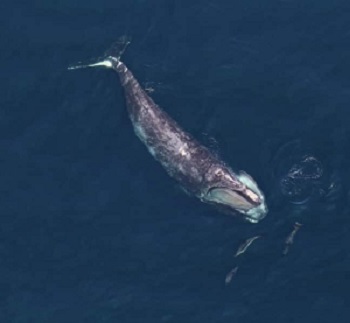 The entanglement of a North Atlantic right whale in Canadian lobster gear earlier this year will increase scrutiny this season on the lucrative southwestern Nova Scotia lobster fishery. In order to be certified as sustainable, the fishery must now prove its actions will not hinder the recovery of the critically endangered species. “This means the fishery has to demonstrate in collaboration with [the Department of Fisheries and Oceans that it’s going to strengthen its strategy to mitigate impacts on right whales,” says Kurtis Hayne, program director for the Marine Stewardship Council (MSC) in Canada. To satisfy the conditions, the Lobster Council of Canada, on behalf of industry and the Department of Fisheries and Oceans (DFO), have developed an action plan to increase overflights in lobster fishing area 33 and increase data collection, says Lobster Council executive director Geoff Irvine. more, >>click to read<< 06:39
The entanglement of a North Atlantic right whale in Canadian lobster gear earlier this year will increase scrutiny this season on the lucrative southwestern Nova Scotia lobster fishery. In order to be certified as sustainable, the fishery must now prove its actions will not hinder the recovery of the critically endangered species. “This means the fishery has to demonstrate in collaboration with [the Department of Fisheries and Oceans that it’s going to strengthen its strategy to mitigate impacts on right whales,” says Kurtis Hayne, program director for the Marine Stewardship Council (MSC) in Canada. To satisfy the conditions, the Lobster Council of Canada, on behalf of industry and the Department of Fisheries and Oceans (DFO), have developed an action plan to increase overflights in lobster fishing area 33 and increase data collection, says Lobster Council executive director Geoff Irvine. more, >>click to read<< 06:39
Lobster ‘red list’ draws ire, lawsuit from Maine fishers
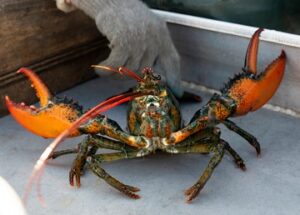 A coalition representing the Maine lobster industry is suing an aquarium on the other side of the country for recommending seafood customers avoid buying a variety of lobster mostly harvested in their state. Industry groups including Maine Lobstermen’s Association are suing the Monterey Bay Aquarium in California for “defamation,” arguing in a lawsuit filed Monday that their prized catch shouldn’t be on a “red list” published by Seafood Watch, a conservation program it operates. Last year, Seafood Watch put lobster from the U.S. and Canada on its list of seafood to avoid due to the threat posed to rare whales by entanglement in fishing gear used to harvest American lobster, the species that makes up most of the U.S. lobster market. >click to read< 15:47
A coalition representing the Maine lobster industry is suing an aquarium on the other side of the country for recommending seafood customers avoid buying a variety of lobster mostly harvested in their state. Industry groups including Maine Lobstermen’s Association are suing the Monterey Bay Aquarium in California for “defamation,” arguing in a lawsuit filed Monday that their prized catch shouldn’t be on a “red list” published by Seafood Watch, a conservation program it operates. Last year, Seafood Watch put lobster from the U.S. and Canada on its list of seafood to avoid due to the threat posed to rare whales by entanglement in fishing gear used to harvest American lobster, the species that makes up most of the U.S. lobster market. >click to read< 15:47
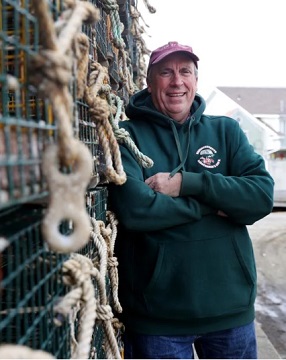
California sustainability group told people to stop eating lobster, so Massachusetts lobstermen file suit
Standing on a dock in his hometown of Gloucester, Mass., lobsterman Arthur Sawyer looked out at the peaceful, calm waters off of Cape Ann. Sawyer, president of the Massachusetts Lobstermen’s Association, and three other Bay State lobster fishers filed a class action lawsuit earlier this month against Monterey Bay Aquarium and the international Marine Stewardship Council, groups that consider lobstering a major risk to North Atlantic right whales and, hence, people shouldn’t buy lobsters anymore. “They have gone overboard targeting Massachusetts when we’ve been doing everything,” Sawyer told the Herald. “We have 100 percent closure right now. There is no place safer for right whales right now on the east coast than in Massachusetts waters.” >click to read< 11:12
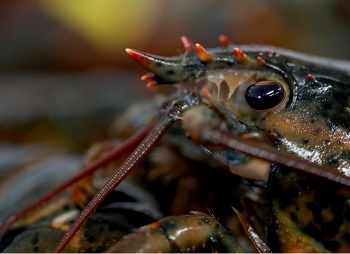
Lobster more than a Maine event
The headline said that Whole Foods would no longer be selling Maine lobster in its stores. My first reaction was to wonder what the lowly, although expensive crustacean had done to warrant such action from Whole Foods usually described as an upscale grocery chain that is owned by Amazon and as such is a part of the Jeff Bezos’ empire. To add insult to injury the California based Monterey Bay Aquarium through its environment focused seafood watch went and “red listed” Maine lobsters. I guess that means shipments of Maine lobsters will be stopped at the California border. I wonder if that includes the border with Mexico where just about anything gets through? Obviously, the Maine lobstering industry is up in arms over all this. >click to read< By Thomas Kirkpatrick Sr 12:56
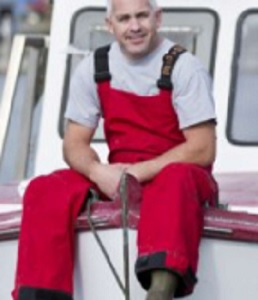
‘We’re the easiest target’: Maine lobstermen snap over regulations row
When French President Emmanuel Macron was treated to butter-poached Maine lobster at President Joe Biden’s first state dinner, the gesture was hailed 500 miles to the north. It was seen as a gesture of solidarity with an industry that is reeling from the latest in a series of blows in recent years. Having survived the pandemic and a trade war with the Chinese during the Trump years, Maine’s 10,000 lobstermen hoped brighter times were ahead. But in mid-November, the Marine Stewardship Council, an independent sustainability policeman, stepped in, triggering a clash between lobstermen, environmentalists, and the upmarket Jeff Bezos-owned Whole Foods grocery chain. >click to read< 07:34
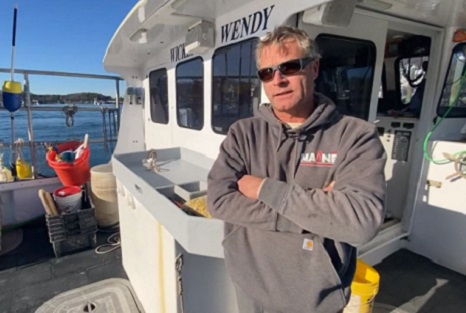
How could Maine lobster get off Monterey Bay Aquarium’s red list?
Jeff White, a lobsterman of 30 years out of York Harbor, said lobstermen from Maine are not hitting or having gear tangled in the endangered North Atlantic right whale’s path, which is the basis for all the increased regulations and legal battles in the first place. “Anyone using this body of water, interacting with the right whales, needs to sit at the table… you can’t just pick one, especially one that has no impact,” White said. “If you are interested in rebuilding the right whale population that is the wrong road to take.” But if the lobster industry wants to be taken off Monterey Bay Aquarium’s red list, and to be taken off suspension from the MSC, what exactly needs to be done? Video, >click to read< 09:34
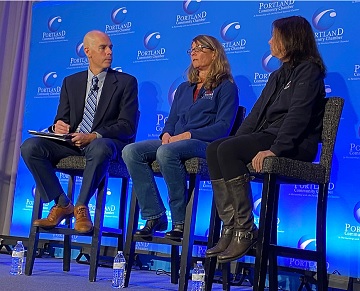
Lobster industry leaders vow to continue fight to protect Maine’s iconic fishery
Maine lobster industry officials told business leaders Thursday that they will continue to fight what they see as unfair and unnecessary federal rules meant to protect endangered right whales. “We are well over a $2 billion industry to the state primarily operating in communities without other job prospects,” Patrice McCarron, head of the Maine Lobstermen’s Association said. “It cannot be overstated.” Lobsterman Curt Brown, who is also a marine biologist, said the industry has been taking steps to protect the whales since the 1990s, including replacing floating ropes, using weak links so ropes break more easily and removing 30,000 miles of rope from the Gulf of Maine. >click to read< 07:34
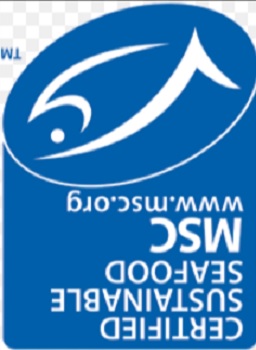
Sustainability group pulls lobster certification over whales
Representatives for Marine Stewardship Council, which is based in London, said Wednesday that the suspension of the Gulf of Maine lobster fishery’s certificate will go into effect on Dec. 15. The organization said in a statement that the danger North Atlantic right whales face from entanglement in fishing gear is a “serious and tragic situation” of “grave concern to all those involved in the fishing industry.” The Maine Lobstermen’s Association feels the MSC decertification is the “direct result of the federal government’s overreach and its misuse of science in overestimating risk from the Maine lobster fishery,” MLA Executive Director Patrice McCarron said Wednesday. >click to read< 17:42
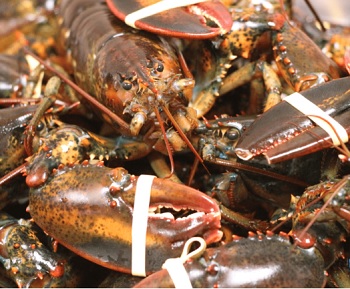
Canadian Lobster Industry Implements Elog JOBEL
Electronic logbooks (Elog) for fisheries are essential for the timely processing and analysis of capture declarations and the sustainable management of Canadian fisheries. Since 2018 in Québec, fishers using JOBEL have demonstrated their fishing activity is compliant with national and international requirements. In the Department of Fisheries and Oceans, fishers, harvesters and scientists now have the information required to evaluate the durability of the Québec lobster fishery. Lobster fishers and harvesters in the Gaspe area now provide the Marine Stewardship Council with accurate information impacting other species during the certification process for their spring fishery. >click to read< 09:41

Canadian Lobster Fishermen Move Towards Electronic Declarations
Electronic logbooks for fisheries are essential for timely processing and analysis of capture declarations and the sustainable management of Canadian fisheries. Since 2018 in Québec, fishermen using JOBEL have demonstrated that their fishing activity is compliant with national and international requirements. Also, Department of fisheries and Oceans, the fishermen and scientists now have the information needed to evaluate the durability of the Québec lobster fishery. Indeed, lobster fishermen in the Gaspe area greatly benefited from being able to provide the Marine Stewardship Council with accurate information on the impact on other species during the certification process for their spring fishery. >click to read< 11:29
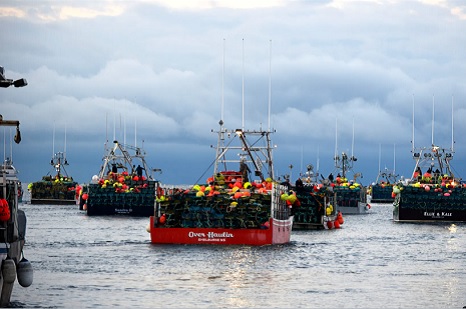
East Coast lobster harvest sustainable, according to non-profit’s criteria — but a Seafood Watch report advises consumers to avoid it
A recent report by a California-based seafood assessment group has the East Coast lobster industry seeing red. While Seafood Watch has put lobster on its “red list” and recommend consumers avoid it, lobster fisheries in most areas of Atlantic Canada have been certified sustainable by another group that has significant credentials in the business of seafood accreditation. In existence for about 25 years, the Marine Stewardship Council is a global non-profit organization that works to end overfishing around the world. Catherine Pigeon-Dubeau, fisheries and commercial manager for MSC in Eastern Canada, said the last review of the East Coast lobster fishery was in July of this year, and the Blue Label certification remains in place. >click to read< 14:10
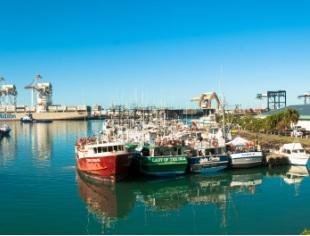
Hawaii Longline Fishery Achieves Global Sustainability Certification
The Hawaii Longline Association’s swordfish, bigeye, and yellowfin tuna fishery has achieved certification for sustainable fishing practices, the Marine Stewardship Council announced today. The fishery is the first Hawaii fishery to enter the MSC program. The MSC Fisheries Standard is a globally recognized standard used to assess if a fishery is well-managed and reflects the most up-to-date understanding of internationally accepted fisheries science and management. The certification follows a rigorous 16-month review carried out by third-party assessment body Control Union UK Limited. >click to read< 16:09

Clearwater Seafoods dropping MSC certification for its Canadian offshore lobster fishery
The blue MSC eco-label tells consumers the seafood they are buying is sustainably caught and has been a point of pride for North America’s biggest shellfish producer. Clearwater’s offshore lobster fishery off southern Nova Scotia was the first fishery on the Eastern Seaboard to receive MSC certification in 2010. The current five-year certification expires at the end of the month.,, The Marine Stewardship Council declined to directly comment on Clearwater’s decision to drop its lobster certification. >click to read< 06:54
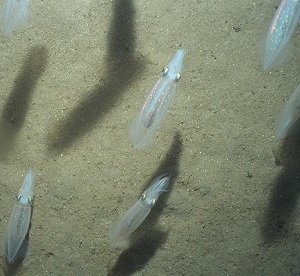
Squid Fishery Responsible for Over 2,500 Jobs, $240 Million in Economic Impact in New England and Mid-Atlantic region
Fishing for longfin squid brings in tens of millions of dollars in annual revenue and supports thousands of full-time jobs, according to a new study from the Science Center for Marine Fisheries (SCEMFIS). “Loligo squid is a significant part of our business and is also a Marine Stewardship Council-certified, sustainable fishery with its products in demand in the U.S., Europe and Asia,” said Jeff Kaelin, Director of Sustainability and Government Relations for Lund’s Fisheries, in Cape May, New Jersey. “This study shows the extent to which our fishery has grown in size and economic importance, which needs to be considered by both fishery and wind-energy regulators making decisions impacting our future.” >click to read< 16:44
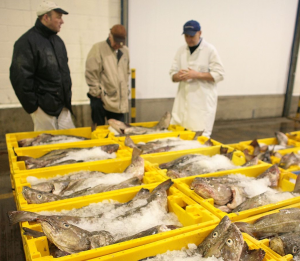
North Sea cod loses Marine Stewardship Council label as population halves in just two years
North Sea cod, a staple for the UK’s fishing industry, has lost its sustainable status, after stocks were found to have almost halved in the last two years. Cod caught around the UK received the “blue tick” sustainability label in 2017, when stocks of the fish were put at around 152,207 tonnes – its highest level since 1982. However, new advice from the International Council for the Exploration of the Sea (ICES) puts the stocks at only 81,224 tonnes – more than 100 tonnes less than predicted. >click to read< 16:51
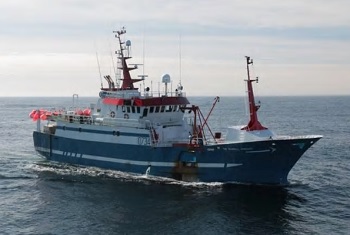
Clearwater keeps sustainability label for offshore lobster fishery following audit
Auditors imposed conditions on Clearwater, downgraded its ratings and concluded “there is evidence of systematic non-compliance in the fishery.” The company said it is pleased with the outcome.,,, The independent audit was ordered after Clearwater was convicted of a “gross violation” in its lobster fishery in September 2018. The company pleaded guilty to illegally storing thousands of traps at sea after,,, >click to read< 09:52
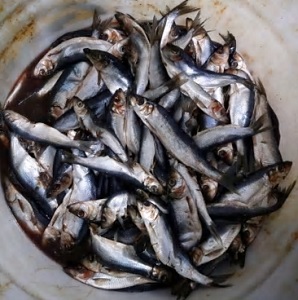
Atlantic Canadian herring fisheries lose sustainability label
All three Marine Stewardship Council-certified herring fisheries in Atlantic Canada have lost their MSC-sustainability certification as the forage fish continues to struggle. Last week, the Seafood Producers Association of Nova Scotia voluntarily suspended its MSC certification on behalf of the 10 companies that operate an 11-vessel fleet of herring purse seiners primarily out of southwestern Nova Scotia.,,, “Over the last three years, the stock has been experiencing a decline and recent science information suggests that the stock is likely now in the critical zone.”,,, Earlier this year, the 19-vessel purse seiner herring fishery off western Newfoundland, led by the Barry Group Inc. of St. John’s, withdrew from MSC certification after auditors warned it was taking too many,,,>click to read<11:06
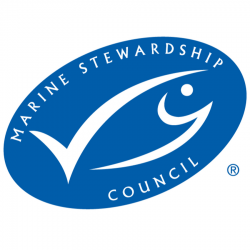
U.S. Shortfin Squid Fishery Achieves MSC Certification
The U.S. Northeast Northern Shortfin Squid (Illex illecebrosus) fishery in the Northwest Atlantic has been certified sustainable against the MSC fisheries standard. The assessment, executed by independent conformity assessment body SCS Global Services and requested by Lund’s Fisheries, Inc. and The Town Dock, was part of a scope expansion following the successful certification of the U.S. Northeast Longfin Inshore Squid (Loligo pealeii) bottom trawl fishery in 2018. Illex joins Loligo as the 2nd squid species in the world to be MSC certified. >click to read<22:37
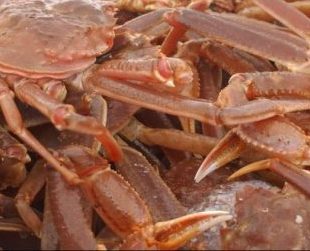
EDITORIAL: Continued suspension of snow crab fishery’s MSC certification seems excessive
Southern Gulf snow crab fishermen took on new challenges of reduced fishing area and temporary closures last year all for the sake of protecting North Atlantic right whales from potential entanglement in fishing gear. They made changes to their gear, too, and their efforts were successful. There were no reported deaths of endangered North Atlantic right whales in Canadian waters in 2018. That’s in sharp contrast to the unprecedented 12 documented deaths in Canadian waters in 2017. But it’s still not good enough for the Marine Stewardship Council. >click to read<17:32
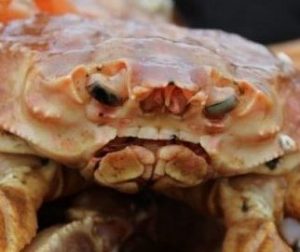
Marine Stewardship Council not convinced a single season with no whale deaths means fishery is sustainable
Despite a year when no North Atlantic right whales died in the Gulf of St. Lawrence, the snow crab fishery has not won back its certification from a marine stewardship group. The Marine Stewardship Council has extended the suspension of its “sustainable” fishing certification for New Brunswick crab products by another year. The council suspended its certification last March after 12 right whales were found dead in the Gulf of St. Lawrence in 2017. At least two deaths were linked to entanglements in snow-crab fishing gear. Last season, the federal government instituted widespread fishing closures and shipping-speed limitations. Although there were no deaths, three whales were still entangled in snow crab gear. >click to read<23:50

Clearwater pulls plug on storing lobster traps at sea
North America’s largest shellfish producer, Halifax-based Clearwater Seafoods, says it has stopped storing lobster traps at sea. Clearwater’s practice of leaving thousands of pots on the ocean floor for weeks at a time earned it a conviction for a “gross violation” of Canadian fishery rules. Unlike every other lobster fishery, there is no season and Clearwater has been awarded a quota of 720 tonnes, which it says represents about 15 percent of all lobster it sells. >click to read<12:58

MSC Sustainability rating drops for Clearwater’s offshore lobster fishery
Clearwater Seafoods’ offshore lobster fishery in Eastern Canada has lost its “recommended” rating from Ocean Wise, a seafood sustainability recommendation program of the Vancouver Aquarium. It’s more fallout from a 2018 conviction for what the Crown called a “gross violation” of a Canadian fisheries regulation by Halifax-based Clearwater. In a separate action, the Marine Stewardship Council, another much larger eco-sustainability organization, has moved up its scheduled “full surveillance audit” of Clearwater’s offshore lobster fishery by two months to April. >click to read<11:00
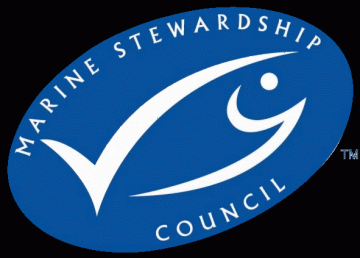
Gulf of St. Lawrence snow crab fishery’s sustainability designation suspended in wake of whale deaths
Canada’s lucrative Gulf of St. Lawrence snow crab fishery has had its certification as an environmentally sustainable fishery suspended. The London-based Marine Stewardship Council (MSC) announced Tuesday it was suspending the certification — a stamp of approval for consumers — because the fishery has been linked to North Atlantic right whale deaths. Twelve of the critically endangered whales died in the Gulf St. Lawrence last year, with necropsies performed on six. >click to read< 12:11







